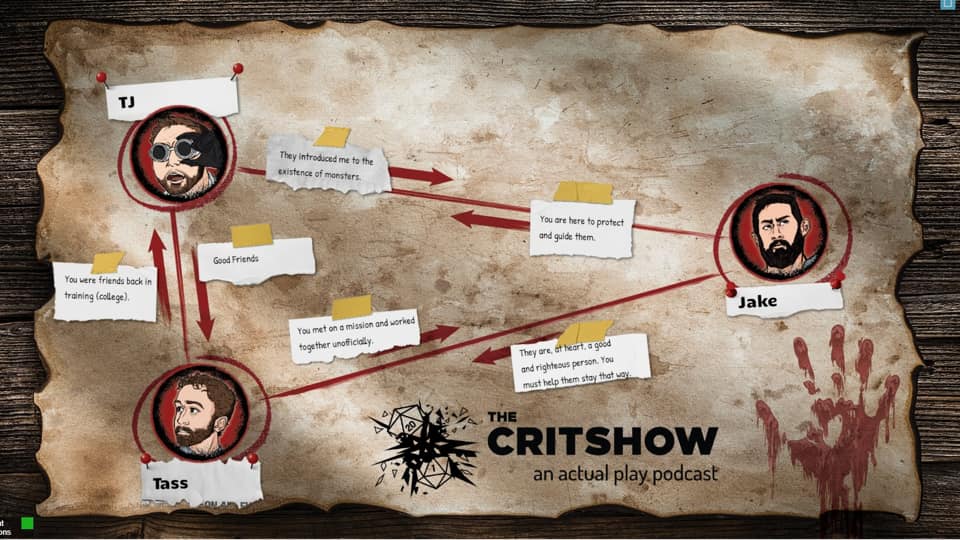
One of our core values here at The Critshow is that people come away from our show not only having heard a great story, but also with a clear enough understanding of the rules of the game to jump in and play.
To that end, we’ve built up a collection of resources to help you on your Monster of the Week journey!
If you’re looking for a fun, ready-made one-shot to run, look no further! We’ve got a full mystery, written by Rev based on a monster created by Sherman Jacobson, available for free. Along with it we’ll send you a copy of Rev’s Keeper Tips, a collection of some of Rev’s most hard-won lessons from his earliest days running the game for the show.
Maybe you’re dying to play some Monster of the Week but have no one to play with. So many of our listeners in our Patreon Discord community were experiencing this, they created a shared universe called The Organization and run mysteries regularly – sometimes multiple times a week. Learn more about The Org and how to become a part of it.

We’re thrilled to have an amazing relationship with Evil Hat Productions, and recently they launched several MotW resources on roll20 which feature, among other things, some playable sample hunters we think you’ll find familiar…
In season one we created The Science Guy playbook for Teej by mashing up The Action Scientist and The Mad Scientist playbooks, and in season four Rev wrote The Seer playbook for Kim. Do you want to play your very own Science Guy or Seer? Grab free copies of these playbooks right here:


When we started playing Monster of the Week on The Critshow, we discovered that our narrative was best served by adding a couple custom mechanics. We’ve always thought of these simply as our House Rules, but we’re frequently asked to explain these mechanics in more detail to Keepers who want to incorporate them into their own games.
Keepers, ask and you shall receive! Below are the codified systems we use for purchasing new equipment with Gear Points, and for Rolling Luck. You can also download the House Rules as a PDF if you’d like to keep it handy for your games.
We’ve tried to be as thorough as possible in our descriptions to make sure everything stays balanced when using these mechanics. However, any of these can and should be adjusted per Keeper discretion based off the needs of your specific game.
At the end of your mystery, take the hunters through the End of session questions as usual. In addition to the experience points awarded, each question answered with a yes awards two Gear Points to each hunter.
Gear Points can be spent to acquire new weapons, armor, or vehicles according to the price schedule below. Gear purchases should take place between mysteries as well, unless there is a narrative justification to support mid-session acquisitioning (e.g., your hunters make a stop at their organization’s headquarters).
Standard Weapon: Weapons that exist in the current playbooks cost 1 Gear Point for the weapon itself plus 1 Gear Point per each point of damage it inflicts.
Custom Weapon: A hunter may work with the Keeper to create weapons beyond those within the playbooks, at the cost of 1 Gear Point for the weapon itself plus 1 Gear Point per damage it inflicts and 1 Gear Point per beneficial weapon tag. Applicable negative weapon tags may be added at the Keeper’s discretion at no additional cost.
Mundane Gear: Gear that is mundane but not readily available that the hunters wish to have on hand (silver bullets, rock salt shells, climbing gear, flails, etc) can be purchased for 1 Gear Point per item (or set of items).
Tactical Gear: Items that would be considered specialty or military grade, such as surveillance gear, throat mics, gas grenades, and the like, may be purchased for 2 Gear Points per item (or set of items).
Armor: A +1 armor item (flack vest, heavy leather coat, etc) costs 3 Gear Points. This armor would be the outermost layer, would not stack with other work armor, and should have a justifiable reason within your canon for how the hunter would acquire it.
Vehicle: A vehicle costs 1 Gear Point per wheel and 1-2 Gear Points per beneficial tag at the Keeper’s discretion. Applicable negative tags may be added by the Keeper at no additional cost.
In addition to Gear Points, the other House Rule we use regularly is Rolling Luck.
When something should be left up to fate (the weather, traffic, cell reception, etc) the Keeper will ask you to roll Luck. Your Luck is 2d6 plus half of your remaining Luck points, rounded down.
Copyright © 2019–2024 Critshow Studios
Designed, built, and hosted by Resonant Entrepreneur · All Rights Reserved
· Team Dashboard ·